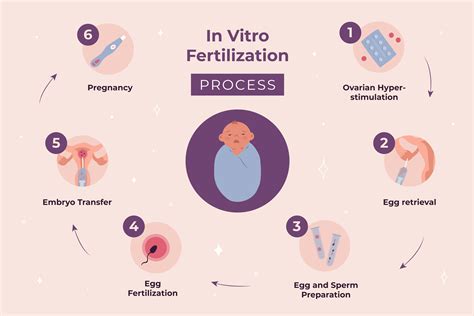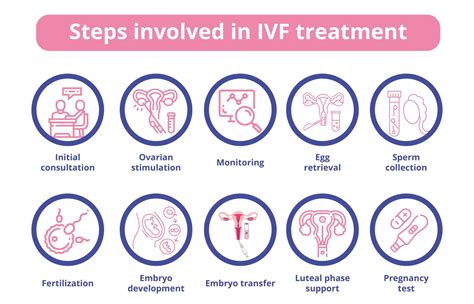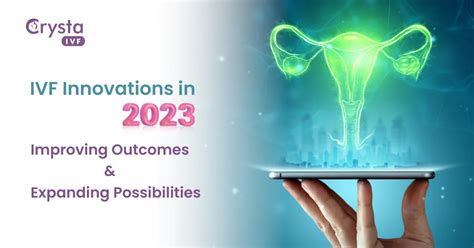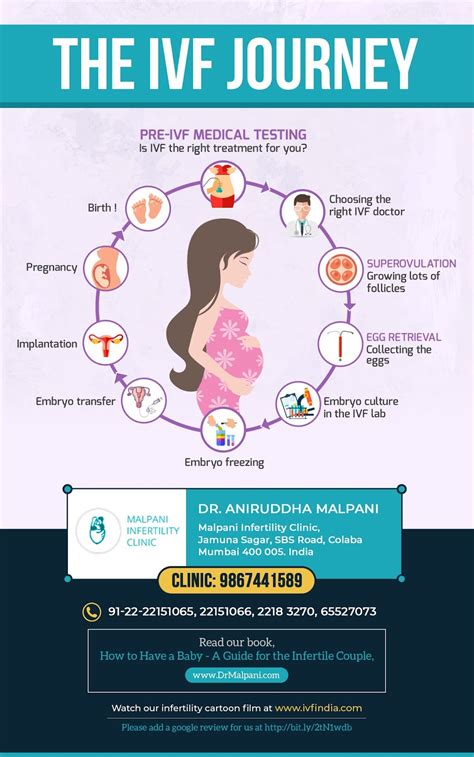Intro
Discover the IVF treatment process, including fertility medications, egg retrieval, and embryo transfer, to increase chances of successful in vitro fertilization and pregnancy through assisted reproductive technology.
The journey to parenthood can be a challenging and emotional one, especially for individuals and couples struggling with infertility. In vitro fertilization (IVF) has revolutionized the field of assisted reproductive technology, offering hope to those who have been unable to conceive naturally. Understanding the IVF treatment process is crucial for anyone considering this option, as it involves a series of complex steps that require careful planning, precise timing, and a deep understanding of the human reproductive system.
Infertility affects millions of people worldwide, and the causes can be varied and multifaceted. For some, it may be due to issues with ovulation, sperm quality, or structural problems within the reproductive organs. Others may face challenges due to age, lifestyle factors, or underlying medical conditions. Whatever the reason, the inability to conceive can be a significant source of distress, affecting not only the individual or couple's emotional well-being but also their relationships and overall quality of life. IVF offers a beacon of hope, providing a viable pathway to parenthood for many who thought it might be out of reach.
The decision to undergo IVF is not one that is taken lightly. It involves a significant investment of time, money, and emotional energy. However, for those who have tried other fertility treatments without success, or for whom IVF is the most suitable option from the outset, the potential rewards can be life-changing. As with any medical treatment, it's essential to approach IVF with a clear understanding of what the process entails, including its benefits, risks, and the likelihood of success. This knowledge not only helps manage expectations but also empowers individuals and couples to make informed decisions about their fertility journey.
Introduction to IVF

IVF is a type of assistive reproductive technology (ART) that involves fertilizing an egg with sperm outside the body. The resulting embryo(s) is then transferred to the woman's uterus, where it will hopefully implant and develop into a healthy pregnancy. This process can be tailored to individual needs, incorporating various techniques such as intracytoplasmic sperm injection (ICSI), preimplantation genetic testing (PGT), and egg or sperm donation.
Benefits of IVF
The benefits of IVF are manifold. It offers a high success rate compared to other fertility treatments, especially for women under the age of 35. IVF also allows for the screening of embryos for genetic disorders, reducing the risk of inherited diseases. Furthermore, it provides an opportunity for individuals and couples to conceive even when natural conception is not possible due to specific fertility issues. The emotional and psychological benefits should not be underestimated, as the possibility of having a biological child can be a powerful motivator and source of joy.The IVF Treatment Process

The IVF treatment process is comprehensive and involves several stages. It begins with initial consultations and diagnostic tests to assess fertility and determine the most appropriate treatment plan. This may include blood tests to evaluate hormone levels, ultrasound scans to examine the ovaries and uterus, and semen analysis for male partners.
-
Ovulation Induction: The first step in the IVF process is ovulation induction, where medications are used to stimulate the ovaries to produce multiple eggs rather than the usual one egg per cycle. This increases the chances of obtaining healthy eggs for fertilization.
-
Egg Retrieval: Once the eggs have matured, they are retrieved through a minor surgical procedure guided by ultrasound. The procedure is typically performed under light sedation to minimize discomfort.
-
Sperm Collection: On the same day as egg retrieval, a semen sample is collected from the male partner. The sperm is then washed and prepared for fertilization.
-
Fertilization: The eggs and sperm are then mixed together in the laboratory to facilitate fertilization. In some cases, ICSI may be used, where a single sperm is injected directly into an egg.
-
Embryo Culture: The resulting embryos are cultured in the laboratory for 3-5 days, during which time they are monitored for growth and development.
-
Embryo Transfer: The healthiest embryo(s) is then selected for transfer to the woman's uterus. The number of embryos transferred depends on various factors, including age and the quality of the embryos.
-
Luteal Phase Support: After the embryo transfer, hormone supplements are prescribed to support the implantation of the embryo and the early stages of pregnancy.
Success Rates and Factors Influencing IVF
The success of IVF depends on several factors, including the age of the woman, the quality of the eggs and sperm, and the presence of any underlying medical conditions. Generally, IVF success rates are highest for women under 35 and decrease with advancing age. Lifestyle factors, such as diet, exercise, and stress levels, can also play a role in the outcome of IVF treatment.Advances and Innovations in IVF

The field of IVF is constantly evolving, with new technologies and techniques being developed to improve success rates and patient outcomes. Advances in genetic testing allow for more precise screening of embryos, reducing the risk of genetic disorders. Additionally, innovations in egg and sperm freezing have expanded the options for fertility preservation, enabling individuals to delay parenthood without compromising their chances of conception.
Challenges and Ethical Considerations
While IVF offers immense hope, it also raises several ethical and social challenges. The high cost of treatment can be a significant barrier, making it inaccessible to many who could benefit from it. There are also ethical considerations surrounding issues like embryo donation, surrogacy, and the selection of embryos based on genetic criteria. As IVF technology continues to advance, it's crucial that these challenges are addressed through open dialogue, policy development, and a commitment to ensuring that fertility treatments are available and accessible to all who need them.Support and Resources for IVF Patients

Undergoing IVF can be an emotionally and physically demanding experience. It's essential for individuals and couples to have access to comprehensive support and resources throughout their fertility journey. This includes counseling services to address the emotional and psychological aspects of treatment, support groups where individuals can share their experiences and connect with others who are going through similar challenges, and educational resources to help navigate the complex world of fertility treatment.
Counseling and Mental Health Support
Counseling and mental health support are critical components of IVF treatment. The process can be stressful, and the risk of disappointment or failure can take a toll on mental health. Access to counseling services can provide individuals and couples with the tools they need to manage stress, cope with the emotional demands of treatment, and maintain a healthy relationship throughout the process.Conclusion and Future Directions

As we look to the future, it's clear that IVF will continue to play a vital role in helping individuals and couples achieve their dreams of parenthood. Ongoing research and innovation will be key to improving success rates, expanding access to treatment, and addressing the ethical and social challenges that arise from these technologies. For those considering IVF, it's essential to approach the journey with a deep understanding of the process, its potential benefits and risks, and the support systems that are in place to help navigate this complex and often emotional journey.
What is IVF, and how does it work?
+IVF stands for In Vitro Fertilization. It's a type of assistive reproductive technology (ART) where an egg is fertilized with sperm outside the body, and the resulting embryo is transferred to the woman's uterus.
Who is a good candidate for IVF?
+IVF is suitable for individuals and couples struggling with infertility due to various reasons, including ovulation disorders, blocked fallopian tubes, male factor infertility, and unexplained infertility.
What are the success rates of IVF, and what factors influence them?
+The success rates of IVF depend on several factors, including the age of the woman, the quality of the eggs and sperm, and the presence of any underlying medical conditions. Generally, IVF success rates are highest for women under 35.
We invite you to share your thoughts, experiences, or questions about IVF in the comments below. Your insights can provide valuable support and information to others who are navigating their fertility journey. Additionally, if you found this article informative and helpful, please consider sharing it with others who might benefit from this comprehensive guide to IVF treatment.
